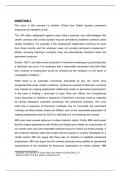Exam (elaborations)
MRL3702 EXAM ANSWERS 13 MAY 2024
- Module
- Institution
MRL3702 EXAM ANSWERS 13 MAY 2024 QUESTION 1 S’boko and Gatedi have been working for Matswaiing-a-matsho (Pty) Ltd (MM) on six months contracts which were renewed twice for further six months. They are earning R10 000.00 a month each. They are now left with a month to complete tenures of their...
[Show more]




